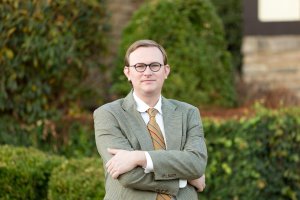A version of this piece will appear in Faulkner Magazine.
Our country has suffered a decline in civic literacy. From 2006 until 2011, the Intercollegiate Studies Institute (ISI) conducted annual studies that evaluated the civic literacy of students and citizens.
The results were discouraging. Most Americans were unable to pass a basic test consisting of straightforward, multiple-choice questions about American heritage, government, and law. One of the ISI studies suggested that students knew more about civics before they began college than they did after they graduated college.
It’s not just students and ordinary citizens displaying civic ignorance. Our political leaders have demonstrated that they lack the understanding of law and government befitting their high office.
Judge Arenda Wright Allen of the U.S. District Court for the Eastern District of Virginia recently began an opinion by stating that the Constitution declared that “‘all men’ are created equal.” This line appears in the Declaration of Independence, not the Constitution.
Senator Chuck Schumer told CNN that the three branches of government were the House, the Senate, and the President. He not only failed to mention the judicial branch, but also treated the bicameral legislature in which he serves as if it were bifurcated into separate branches of government.
Congressman Sheila Jackson Lee, while criticizing the alleged unconstitutionality of proposed legislation, claimed that the Constitution was 400 years old.
These anecdotes suffice to show the extent to which Americans no longer respect their founding principles or the framework of government established in our Constitution.
That is why the Blackstone & Burke Center for Law & Liberty was founded at Thomas Goode Jones School of Law. We seek to promote the principles of the common-law tradition and American constitutionalism so that the next generation of civic leaders will make informed, thoughtful decisions about the future of our country.
Ordered liberty in the United States has rested on a commitment to religious faith and pluralism, fidelity to the rule of law, and ancient liberties grounded in the conviction that all humans are created equal and endowed by their Creator with certain inalienable rights. These values characterize the American experiment. Our society is built upon them, and its continued vitality depends upon maintaining and promoting our commitment to them.
Therefore, the Blackstone & Burke Center will educate students, teachers, judges, and political leaders in the areas of religious freedom, freedom of association, freedom of speech, and economic freedom. We will coordinate educational programs, research initiatives, and judicial conferences that examine the norms and nurture the institutions of ordered liberty.
We believe that the principles and ideas of the American Founding are worth conserving and celebrating. Our vision is to help renew an America where freedom, opportunity, prosperity, and civil society flourish.
The Blackstone & Burke Center has recruited of board of advisers consisting of internationally recognized thought-leaders such as Judge Andrew Napolitano, Senior Legal Analyst for Fox News; Dr. Robert P. George, McCormick Chair in Jurisprudence at Princeton University; Dr. James R. Stoner, Hermann Moyse Jr. Professor and Director of the Eric Voegelin Institute for American Renaissance Studies at Louisiana State University; Professor F. H. Buckley, George Mason University Foundation Professor at Antonin Scalia Law School; Dr. Don Devine, former Director of the U.S. Office of Personnel Management in the Reagan Administration and Senior Scholar at the Fund for American Studies; Dr. Ingrid Gregg, past president of the Earhart Foundation; and Dr. Daniel Mark, Vice Chairman of the U.S. Commission on International Religious Freedom and Professor at Villanova University.
In our first few months of operation, we organized and hosted a reception featuring a Library of Congress traveling Magna Cart exhibit, which was displayed in the rotunda of the Alabama Supreme Court for three weeks. Judges, business and university leaders, lawyers, students, teachers, and the general public attended the reception to commemorate and learn about Magna Carta, and Acting Chief Justice Lyn Stuart of the Alabama Supreme Court and Judge William “Bill” Pryor of the Eleventh Circuit Court of Appeals delivered remarks about Magna Carta.
The Blackstone & Burke Center received a grant from Liberty Fund, Inc., to gift the entire Liberty Fund book and media catalog to the law library, as well as a grant from the Association for the Study of Free Institutions to bring a prominent speaker to our campus next fall.
The Blackstone & Burke Center also established a formal affiliation with Atlas Network and, through Atlas Network, partnerships with such organizations as the Acton Institute, American Enterprise Institute, American Legislative Exchange Council, Becket Fund for Religious Liberty, Cato Institute, Center for Competitive Politics, Claremont Institute, the Federalist Society, the Foundation for Economic Education, the Foundation for Individual Rights in Education, Freedom Foundation, the Goldwater Institute, the Heritage Foundation, the Hoover Institution, the Hudson Institute, the Independent Institute, Institute for Justice, Intercollegiate Studies Institute, the Law & Economics Center at George Mason University, Liberty Fund, Mackinac Center for Public Policy, Mont Pelerin Society, National Review Institute, Pacific Legal Foundation, the Philadelphia Society, the Pope Center for Higher Education Policy, Reason Foundation, State Policy Network, Students for Liberty, the Fund for American Studies, Young Americans for Liberty, and more.
Finally, the Blackstone & Burke Center received a grant from the Charles Koch Foundation under the auspices of the Philadelphia Society to direct a professional development conference on academic freedom at a meeting of the Philadelphia Society in Pennsylvania. Attendees included graduate students and university administrators from across the country who shared an abiding interest in the meaning, purpose, and characteristics of intellectual exchange in university settings.
We at the Blackstone & Burke Center look forward to a promising future as we inspire and educate new leaders in the principles and foundations of ordered liberty. To learn more about the Blackstone & Burke Center, visit our website at www.blackstone&burke.com.


